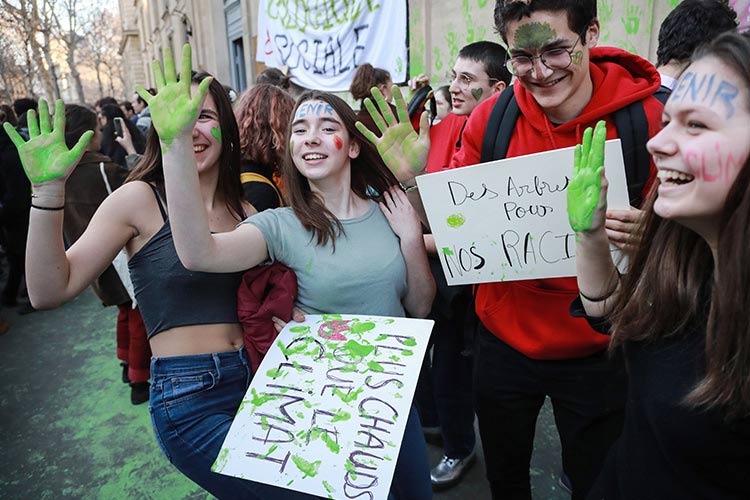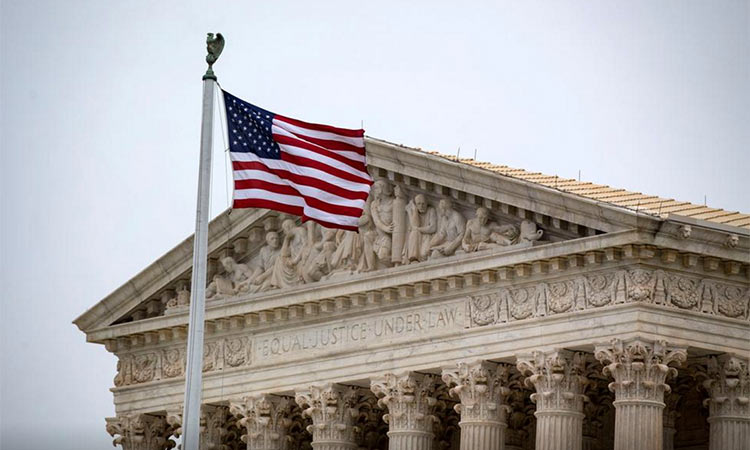Global school strikes over climate issue

Michael Jansen
The author, a well-respected observer of Middle East affairs, has three books on the Arab-Israeli conflict.

Youths demonstrate near the French Ministry for Ecology in Paris. Photographer: Jacques Demarthon / AFP
The movement was launched on Aug.20 last year when Swedish ninth-grader Greta Thunberg, 15, refused to go to school until after the Sept.9 general election in her country. Heat waves and wild fires made last summer Sweden’s hottest ever. Thunberg was inspired by US students who mounted protests against their country’s lax gun laws following the 2017 shooting of 17 students and teachers in Parkland, Florida. When castigated for missing her lessons, she stated, in fluent English, “I have my books here. But also I am thinking: what am I missing? What am I going to learn in school? Facts don’t matter anymore, politicians aren’t listening to the scientists, so why should I learn?” She argued, “I don’t care if I get into trouble at school. I believe that one person can make a difference.”
She demanded the new government honour the terms of the Paris climate change agreement by cutting carbon emissions and taking drastic measures to reduce packaging and plastic bottles. She sat on the steps of parliament holding a sign reading, “School Strike for Climate” and handed out leaflets accusing adults of risking her future. She said she would return every Friday until Sweden is in compliance. She called on students across the world to join, “FridaysForFuture.”
School strikes went global in November. Thousands of students abandoned their classrooms in distant Australia despite criticism from Prime Minister Scott Morrison. Strikes multiplied in December, drawing in more than 270 cities in Australia, Austria, Belgium, Canada, Holland, Germany, Finland, Japan, Switzerland, and the US. Students in additional countries joined in the new year, with numbers swelling from one or two or a handful to reach tens of thousands. At the end of last month, Greta Thunberg was invited to the World Economic Forum in Davos where she took her message to billionaires, officials, and technocrats attending.
Scientists have celebrated Thunberg’s initiative and the student strikes movement. Conservative parents have urged school teachers and administrators to crack-down on the children. Politicians have tried to ignore yet another challenge to their lackadaisical approach to the planet’s most urgent emergency.
Experts say greenhouse gas emissions rose to a record high in 2018 instead of remaining flat as they had over recent years. Scientists argue the rise is due to additional coal-fired power stations in China, the US, Europe, India and other countries, new cars on the world’s roads, and an increase in intestinal gases produced by farming to meet the demand for meat. China was the largest polluter, followed by the US and India. The rise in emissions has coincided with increased use of solar and wind power.
A worried World Bank is set to invest about $200 billion in combating climate change from 2021-25, doubling the amount pledged in the 2015 Paris climate change agreement. Some members in the crop of newly elected lawmakers in Washington, the capital of climate change deniers, have put a Green New Deal on the US agenda. This is a proposal for drawing up a blueprint for a complete transformation of the economy and destructive consumption habits of individuals, societies, countries, and continents. A detailed plan is set to be completed by early next year and presented to Congress with the demand that legislation should be implemented within 90 days.
This plan has become the political platform of the left wing of the US Democratic Party as members of the House of Representatives and one-third of senators gear up for the November 2020 Congressional and presidential elections. What happens to the Green New Deal will depend on whether its prime movers return to Washington.
Modelled on President Franklin D. Roosevelt’s New Deal that rescued the US from the Great Depression of the 1930s, the Green New Deal is already a decade old. Its sponsors face opposition from industrialists, fossil fuel peddlers, and conservatives determined to preserve the increasingly unstable and uncomfortable status quo. Green New Dealers and students need to tackle indifference among a majority of citizens, including the young.
An Ispos Mori poll conducted in Britain last month — where far more children have joined the protest movement than in the US — reveals that only 12 per cent of the younger generation see pollution and the environment as an urgent issue. Pollster Ben Page was quoted in the Guardian as saying that until young people block roads in cities and towns, the children’s climate crusade will not force abandonment of destructive policies and behaviour.
Feb.14 was the first anniversary of the Parkland shooting spree that produced the mass US student movement demanding gun control. So far, the US political establishment has done little to curb rampant gun violence that has plagued that country for decades. For politicians captive of the powerful gun lobby, the National Rifle Association, school children’s lives do not matter.
To ensure the survival of the planet, climate change must be addressed in tandem with environmental degradation. Warnings of a new disaster have been issued by the first global scientific review which shows that more than 40 per cent of insect species are in decline and 30 per cent are endangered. The rate of extinction is eight times greater than that of mammals, birds and reptiles, many of which depend on insects for survival. As insects are essential for pollinating plants providing human food, the trend must be halted and reversed. Climate change has joined the prolific use of pesticides, transformation of woodland into farms and urbanisation as chief culprits causing a looming catastrophe.



